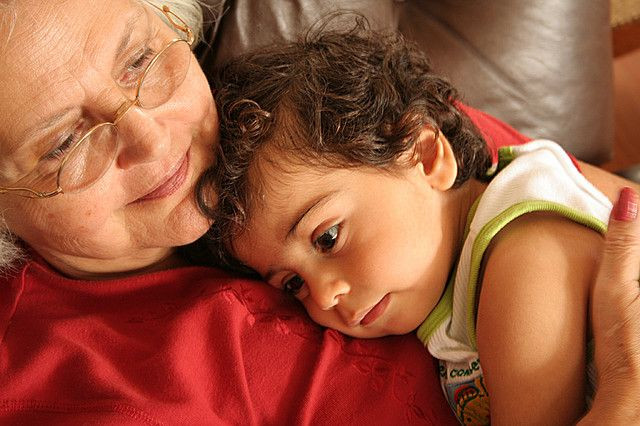Grandmas Helped Humans Evolve Longer Lifespans

Grandmas may be the reason why humans live longer than apes, a new study suggests.
Scientists say female chimpanzees rarely live past their 30s or early 40s, but a computer simulation revealed that the influence of grandmothers could prolong the chimpanzee's lifespan to human levels in 24,000 to 60,000 years.
The latest finding, published in the journal Proceedings of the Royal Society B, supports the theory known as the "grandmother hypothesis" suggests that humans evolved longer lifespans than apes because human grandmothers help take care of their grandchildren after their own childbearing years were over.
Up until now, anthropologists have been divided between the "grandmother hypothesis" and the "hunting hypothesis" to explain how humans evolved long lives.
Researchers explain that the grandmother hypothesis says that when grandmothers help feed their grandchildren after weaning, their daughters can produce more children at shorter intervals. The children become younger at weaning but older when they first can feed themselves and when they reach adulthood, and the ancestral females who lived long enough to become grandmothers passed their longevity genes to more descendants who had longer adult lifespans as a result.
However, researchers who believe in the hunting hypothesis say that as resources dried up for human ancestors in Africa, hunting was better than foraging for finding food. Researchers said that that hunting led to natural selection for bigger brains capable of learning better hunting methods and savvy use of hunting weapons, and the women then formed "pair bonds" with men who brought home meat.
Researchers said that many anthropologists argue that increasing brain size in our ape-like ancestors was the major factor in humans developing lifespans different from apes.
However, a mathematical model confirms that the grandmother theory in explaining the evolutionary advantage early humans had over "our great ape cousins," said senior study author Kristen Hawkes, a professor of anthropology at the University of Utah.
"Grandmothering was the initial step toward making us who we are," Hawkes said. She said that childcare from grandmothers resulted in "a whole array of social capacities that are the foundation for the evolution of other distinctly human traits, including pair bonding, bigger brains, learning new skills and our tendency for co-operation."
Most primates and mammals collect their own food after weaning, but as our ancestors evolved in African during the past 2 million years, the environment changed and African forests began to be replaces by dry savannah two million years ago, and children were no longer able to forage for themselves.
The grandmother hypothesis suggests that older women then began taking up childcare responsibilities like cracking hard nuts, digging up potato-like tubers from the ground, which allowed their daughters to keep producing and caring for new babies.
Researchers said that the result meant long-lived and healthy grandmothers were able to pass on their genes to more descendants, and increase the number of women who would survive after menopause.
After simulating the impact of childcare from grandmother on a group of animals that only lived for 25 years after adulthood, like chimpanzees, researchers found that "grandmothering" would allow female chimps to evolve to live for 49 years, which is the same as ancient human hunter-gatherers, after becoming an adult in 24,000 to 60,000 years.
Published by Medicaldaily.com



























